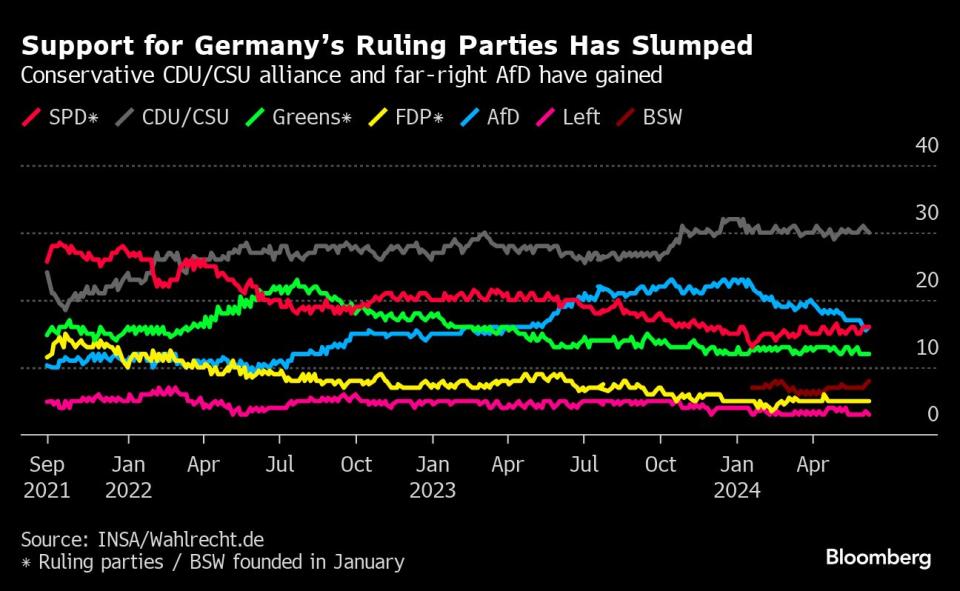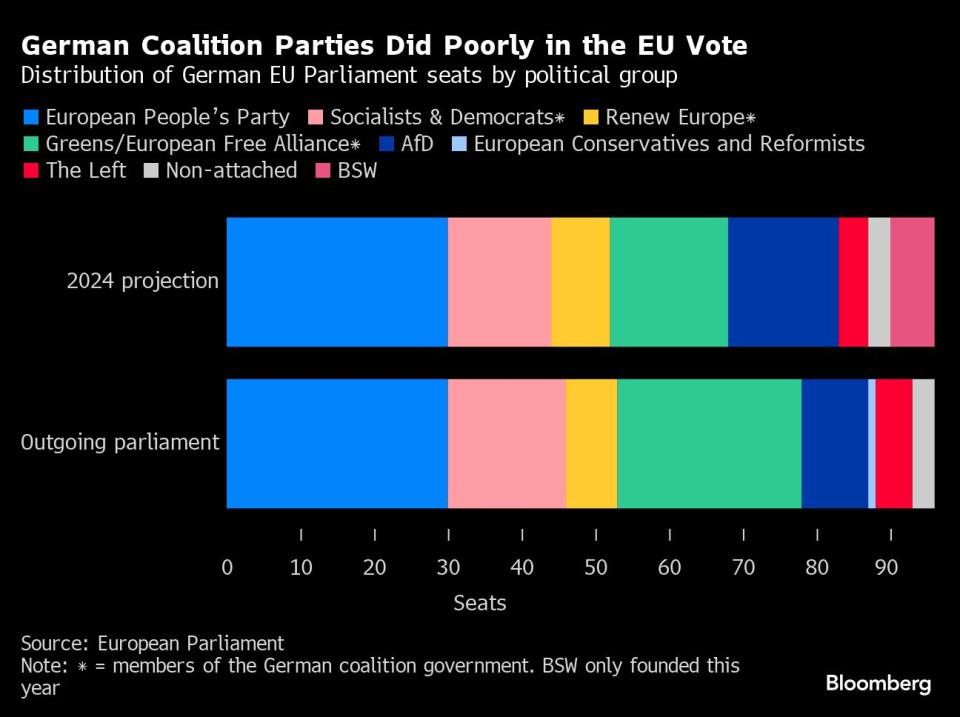Scholz Heading for Another Election Rout in Eastern Germany
(Bloomberg) -- Chancellor Olaf Scholz’s ruling coalition looks to be on course for another drubbing in September when elections are held in three eastern regions where the far-right Alternative for Germany is the strongest party.
Most Read from Bloomberg
NYC Landlord to Sell Office Building at Roughly 67% Discount
Russia Is Sending Young Africans to Die in Its War Against Ukraine
As well as slumping to their worst ever result in a national vote on 13.9%, Scholz’s Social Democrats were hammered in the former communist east in Sunday’s European Parliament election. Voters in Saxony and Thuringia go to the polls on Sept. 1, before Brandenburg — the region that surrounds the capital Berlin — holds its election three weeks later.
In Saxony, the SPD managed only 6.9%, in Thuringia 8.2% and in Brandenburg 13.1%, according to preliminary results from the EU vote.
The AfD, which finished second overall behind the conservative CDU/CSU alliance, was the strongest party in all five eastern regions, scoring above 30% in Saxony and Thuringia. In those two states, the three ruling parties in the government in Berlin — the SPD, the Greens and the FDP — barely managed 15% between them.
Their woeful performance further weakens the government and prompted calls from opposition lawmakers for the next national election, due in the fall of 2025, to be held now.
Scholz dodged a question about the possibility of a fresh election at a news conference on Monday in Berlin after talks with Chilean President Gabriel Boric.
“Nobody would be well-advised to simply go back to their daily work,” Scholz told reporters, reiterating a call for people to reject far-right forces in Germany and Europe.
“At the same time it’s also about us doing our work, making sure that our country becomes more modern and advances,” he said, adding that the focus should be on winning back the trust of voters.
Scholz and his allies in government have little choice now but to go into survival mode and focus on sealing an agreement on next year’s budget, which they are aiming to sign off in cabinet on July 3.
The negotiations have been another source of tension in the coalition after Finance Minister Christian Lindner insisted all of his cabinet colleagues except Defense Minister Boris Pistorius must make do with less cash.
Senior CDU lawmakers questioned whether Scholz retains the authority to lead the country and CDU General Secretary Carsten Linnemann said he should submit to a confidence vote in the lower house of parliament.
“He could also win it and then bring about a change of course,” Linnemann said Monday in an interview with public broadcaster ZDF. “But it would simply be a matter of honesty — you can”t rule this country with 14%.”
Markus Soeder of the CSU, the premier of Bavaria, said Germany should follow France in bringing forward the next election.
“This government is basically finished,” Soeder said in an interview with broadcaster ntv. “Our country needs a fresh start.”
At a news conference Monday, Lindner dismissed the idea of a confidence vote, saying that as long as the three parties respect their coalition agreement there is no need to question the government’s effectiveness. Steffen Hebestreit, Scholz’s chief spokesman, said at Monday’s regular news conference that there are no plans for a new election.
“There is no reason to believe that the coalition will fall apart,” SPD General Secretary Kevin Kuehnert said in an interview with Welt TV. “We still have one year left and must work our way out of the trough we are undoubtedly in at the moment.”
Although the AfD’s leaders expressed delight with Sunday’s performance, when the party increased its share of the vote by nearly five percentage points to 15.9%, they are still no closer to getting into regional government in any federal state.
Between them, Germany’s other parties have erected a so-called “firewall” to sideline the AfD. That appeared to be functioning in Thuringia on Sunday, where AfD candidates failed to win any of the run-off votes for district administrator.
Nationwide support for the AfD peaked as high as 23% at the end of last year, though it was dented in recent weeks due to a series of controversies, including allegations of spying for China and receiving cash from a pro-Russia media outlet.
Tanja Goenner, managing director of Germany’s BDI industry lobby, said the gains made by right-wing populist lawmakers in the EU vote is a worrying sign.
“This means that the proportion of those who, like us, want to shape and strengthen Europe is dwindling,” Goenner said Monday in an emailed statement. “Anti-European parties jeopardize social cohesion and our prosperity.”
--With assistance from Chris Reiter, Kamil Kowalcze and Arne Delfs.
(Updates with Scholz comments starting in sixth paragraph)
Most Read from Bloomberg Businessweek
As Banking Moves Online, Branch Design Takes Cues From Starbucks
Legacy Airlines Are Thriving With Ultracheap Fares, Crushing Budget Carriers
Food Companies Hope You Won’t Notice Shortages Are Raising Prices
Sam Altman Was Bending the World to His Will Long Before OpenAI
©2024 Bloomberg L.P.





